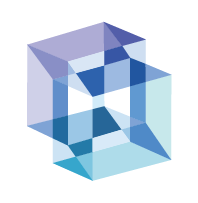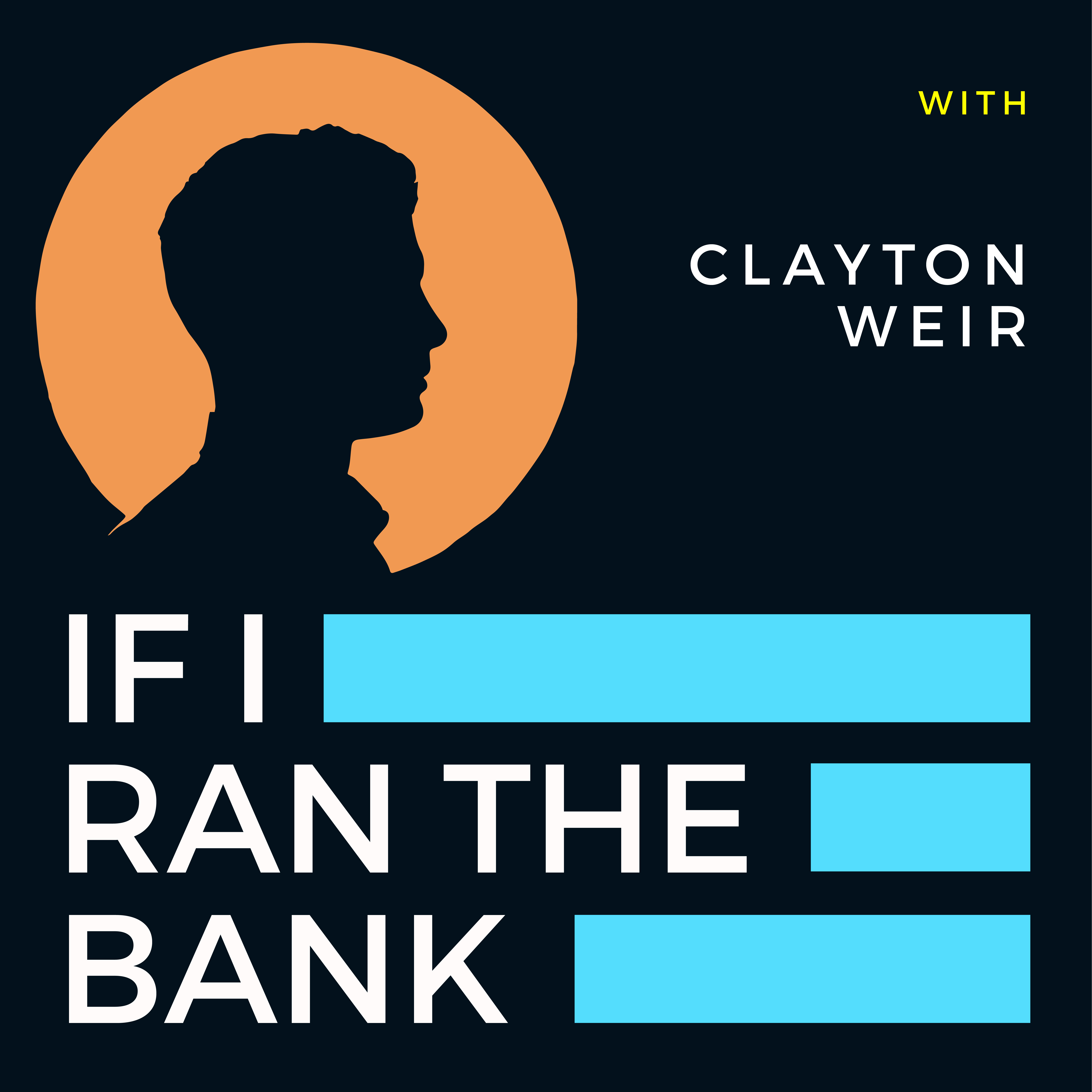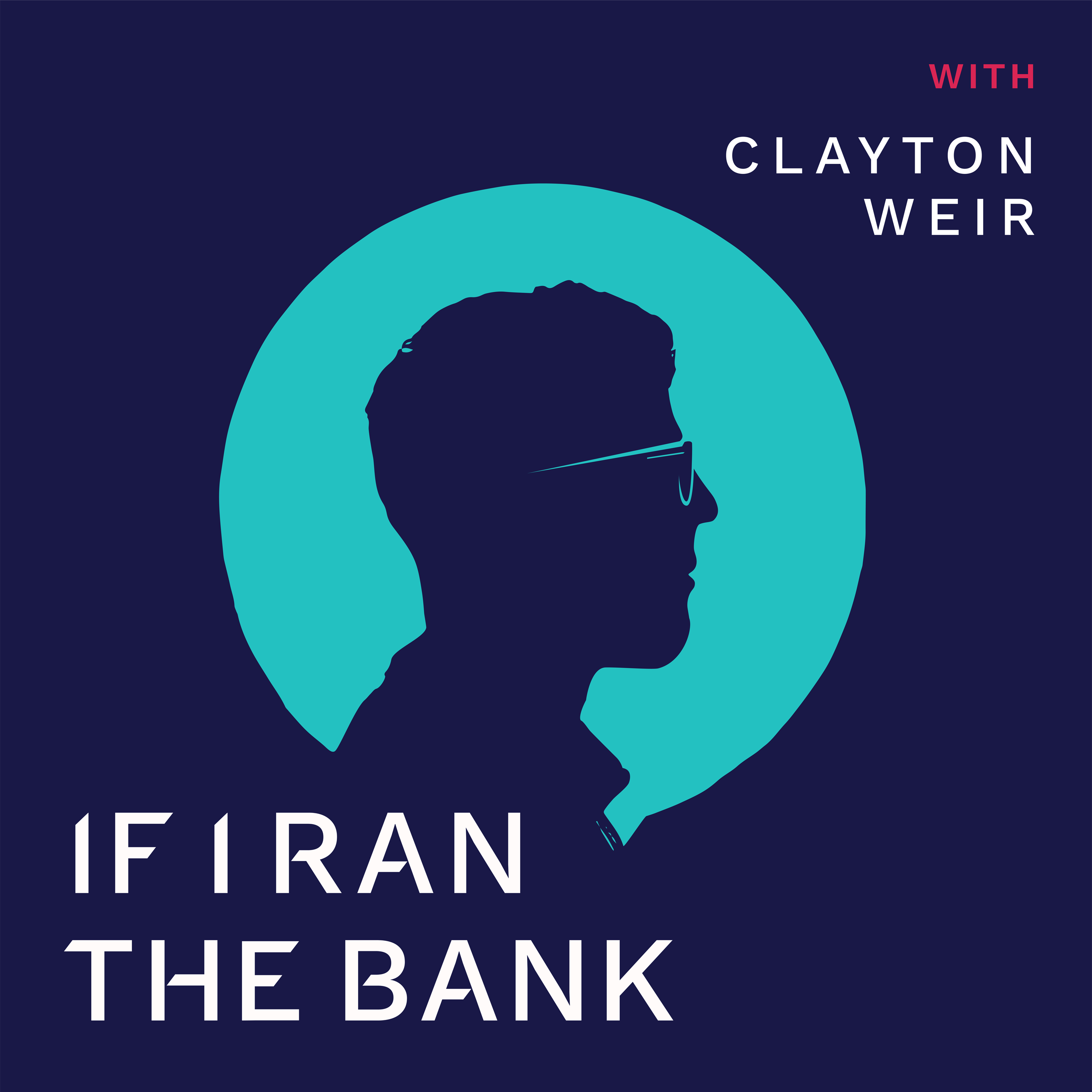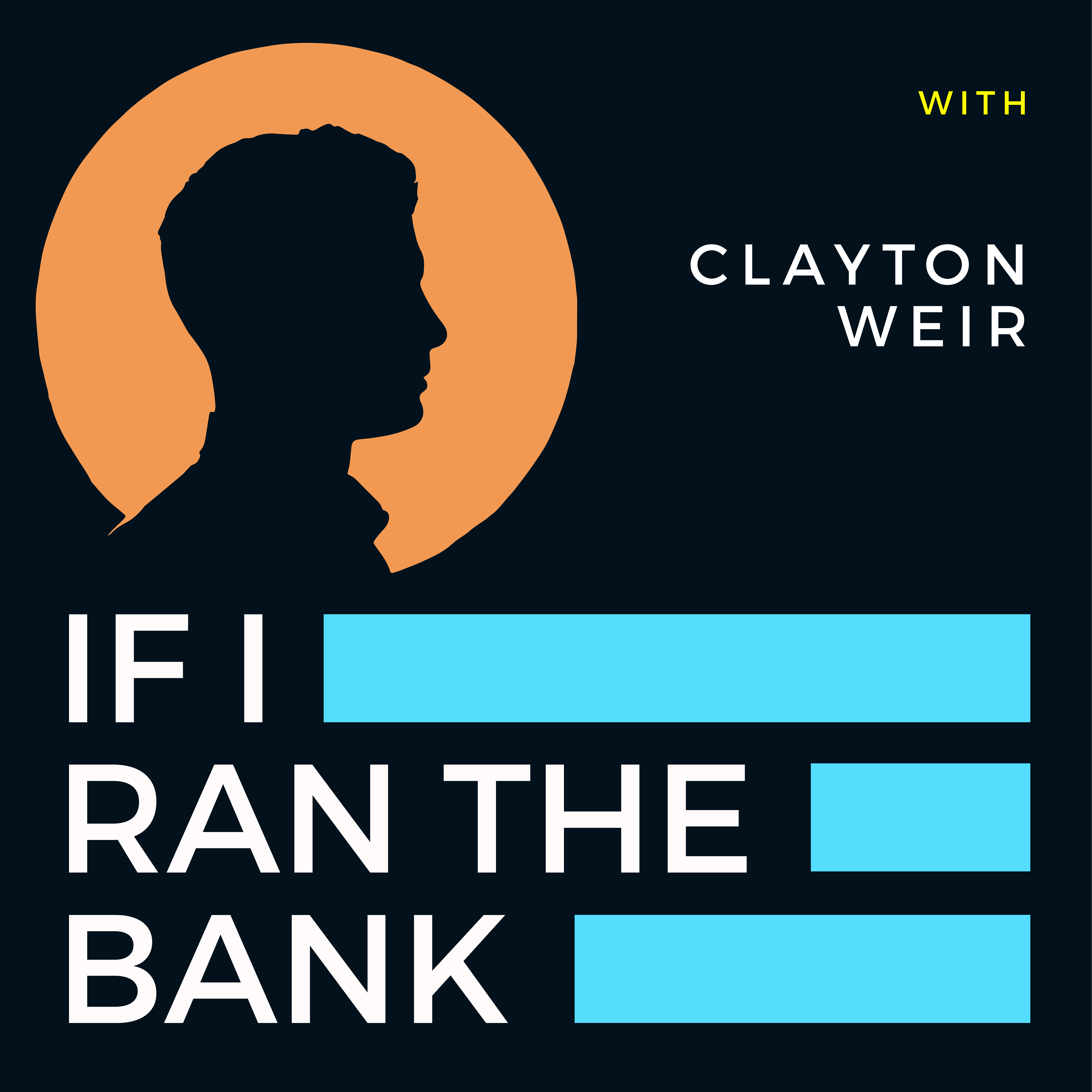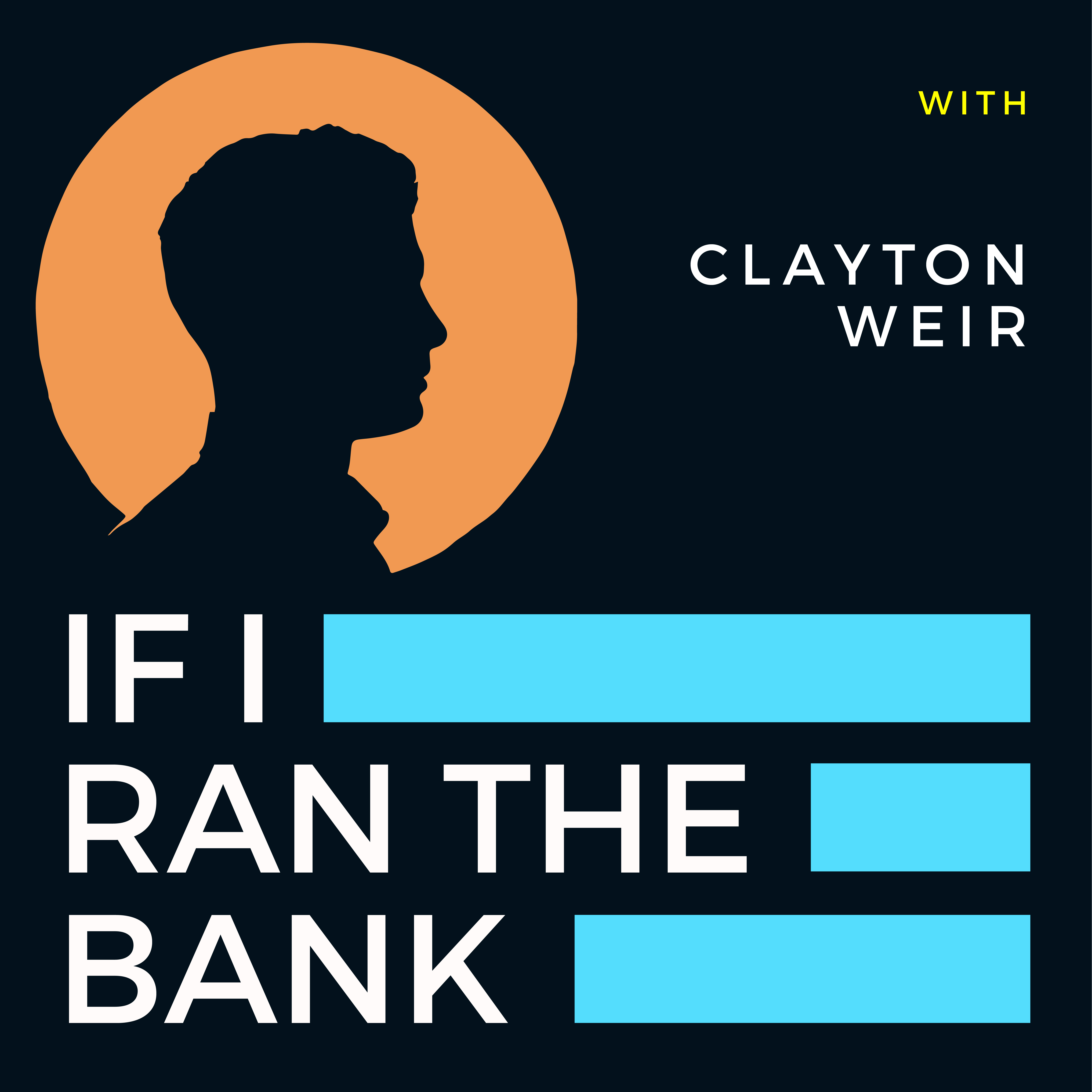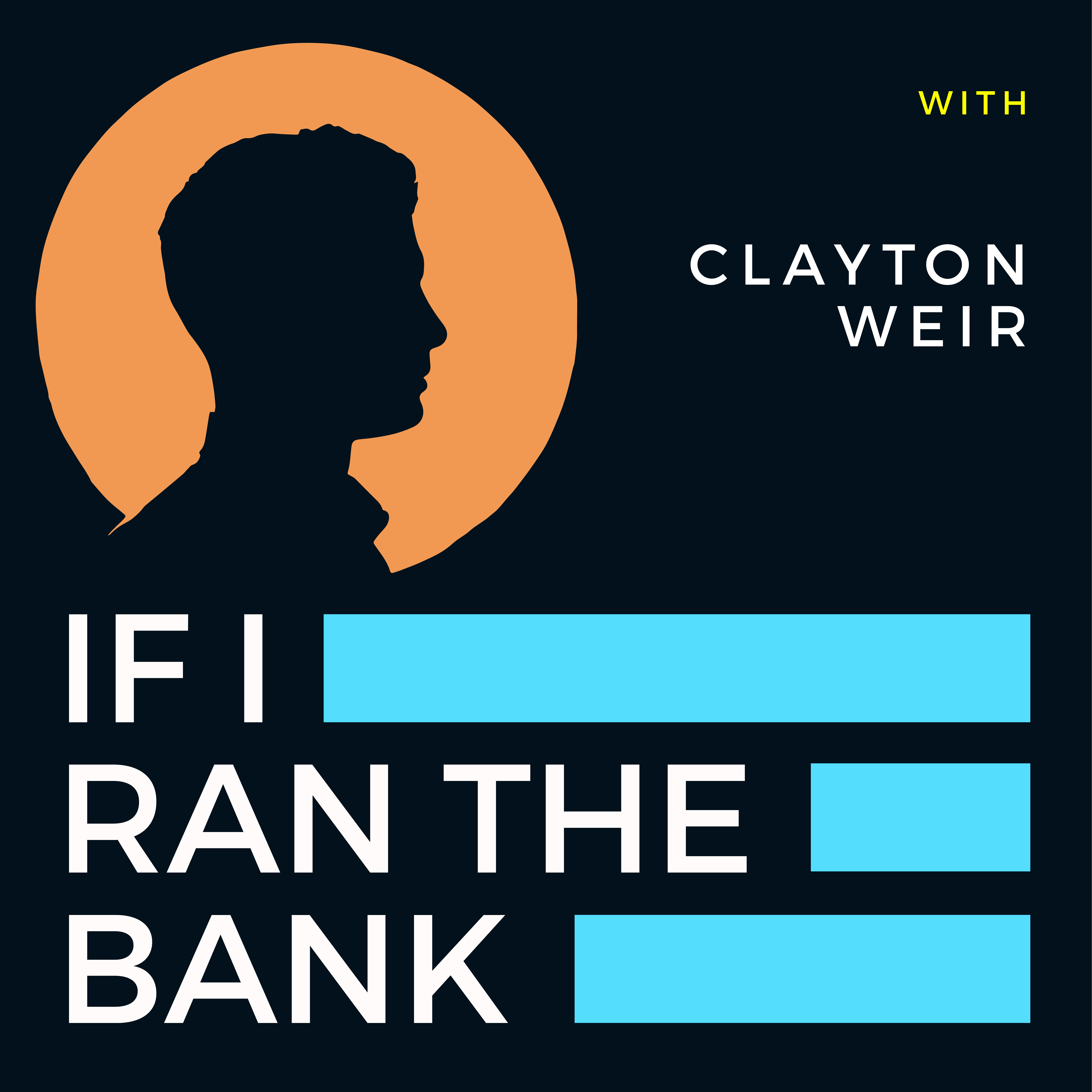Breaking into Banking With Software with Kerry Agiasotis
- 0.5
- 1
- 1.25
- 1.5
- 1.75
- 2
Voiceover: If I ran the bank is a podcast hosted by Clayton Weir, co- founder and head of product and strategy at FISPAN, a FinTech that is enabling banks to provide contextualized consumer life experiences to their business clients. Clayton's a thought leader in financial innovation and hits on the hottest topics in banking, finance, and the future of payments. And he wants to know if you ran the bank, what's the one thing you'd go all in on. Please tune into Spotify, Apple Podcasts, Google Play, or wherever you get your podcasts. And now here's your host, Clayton Weir.
Clayton Weir: Hey everyone. Welcome to another episode of If I ran the bank. I am your host as always, Clayton Weir. And I'm very excited for today's guest. I have with me Kerry Agiasotis who is the APAC market leader for the Sage business. Most of you know Sage. It's one of the largest vendors of financial operational software for businesses anywhere in the world. And I think, prior to that, what's interesting about Kerry is, he was the President of Western Union Business Solutions. So that's one of the biggest non- bank sort of payment or financial institutions that services businesses globally. He also did some tours of duty with Travelex and deep again, I guess coming full circle, in the enterprise software business with Oracle. I wanted to have Kerry on the show to talk a lot about that. About how his role as a servicer of the operational needs of the small businesses or the technology that helps them meet their operational needs, how that's kind of intersecting and interacting with the world of financial services today. And I think it's going to be a really interesting conversation. Thanks for joining us Kerry. Is there any blanks you want to fill in on your background?
Kerry Agiasotis: No, I think you summarized it well. And like you said, I've had the good fortune of sort of oscillating in and out of the tech and financial services arena. And so I can sort of see where we sit today, a really exciting time in how those things are really blending. So to your point, it's a really interesting topic.
Clayton Weir: Can you maybe just set a better context for the listener folks? So the types of businesses that are your customer and maybe some of the types of problems or jobs that your tools help solve for them today?
Kerry Agiasotis: Yeah, sure. Look, we're a SaaS provider of business management. So essentially, we serve small to mid- size businesses really with their core business operational platforms. So accounting, payroll, HR, at the very core. We also interestingly serve accountants. So we address the needs of small to mid- size accounting firms in tax and practice management. And that's interesting because we get to sort of see the sort of through lens to their clients. The way that they manage small businesses and how the industry is shifting from a digitalization standpoint to provide new services. And so it's a really interesting time through that space as well, which we can touch on.
Clayton Weir: Yeah, no, I mean, maybe just because you kind of left that dangling there, it's maybe something to expand on it. I think from the bank's perspective, it's often not thought through thoroughly or it's not as visible. Do you maybe want to characterize the state of that? How these kinds of outsourced bookkeepers or these accountants inaudible like their market share when we're talking about small and medium businesses of them kind of being the primary sort of financial operator versus a finance department, the businesses is probably really material.
Kerry Agiasotis: It's huge. And so it's one of these things that I had little exposure to until I joined Sage four years ago. We serve, just as an example, about 7, 000 odd bookkeepers, small to mid- size practices who touch close to about a million businesses and well in excess of a couple of million individuals. So when you think about just that ecosystem, right, and the importance of that ecosystem, because the touch point with that firm, there is no more trusted relationship at the very core. They're managing the relationship between their business and government. And so the financial welfare of that organization in the eyes of government is something that all businesses care about and ensuring that they're obviously compliant with their requirements. And so you go back to the topic at hand, at the very core, what that industry is doing it's about risk management. But the fundamental shift is now driving to true value add, and that's the competition. Everybody is competing for a share of that value add wallet, if you like, right. Every organization on the planet is now looking beyond what it is that they used to do as a core and how they evolve into something more than that. And that's where I really see when you sort of come back to these two spaces of software and financial services, I see those industries really now blurring and crossing over in terms of competition to drive value add in very, very similar spaces, if not identical spaces.
Clayton Weir: I think that's a really good transition, again. And so let's unpack that. So maybe we'll start. Saying it's linear, maybe is disingenuous, right? There's obviously somebody like yourself, you're in there as the primary ledger of the business and hold all this operational data and help them keep their books in order. And the bank does a lot of really important jobs, and maybe a way to think about how important they are... I know in the middle market and corporate space globally, that ERP licensing business is about the same as the transaction banking kind of revenue business, right? So total amount of fees paid on treasury banking are about the same as what you pay for your kind of operational software, right? So two really big celestial bodies in the business world. Maybe those aren't the only two players that matter here, but those are two really big players that, in their case are probably inching towards your world and some of the jobs you do. And in your case are probably backing out from some of these in the weeds jobs you're doing for the business, to how it kind of finishes full cycle. Do you want to maybe just walk us through that? Maybe from your perspective first and then maybe if you could hypothesize from the bank's perspective into your world?
Kerry Agiasotis: Yeah. Look, completely. And so you sort of come back to where I think most industry and businesses sort of start and especially established ones, which is to protect and expand. So a software business, like Sage, has been around a long time. It has got a really rich vein of a large customer base and recurring income. And so now you're looking for ways of expanding and the most obvious is looking at very close and tight adjacencies. In our world that fundamentally is when you think about the very core of running now, the P& L of a business, running the accounts of a business, it's essentially managing inflows, outflows. And Where that data lives and where those transactions lie is essentially in the banks that you deal with. That you effectively have relationships with it. So that first crossover that we saw in this space has really been integration into AP and AR- related activity. So bank feeds coming in for bank reconciliation type work, for receivables, as well as integration into payment systems for payables. And so that crossover was the sort of starting point. Now come back to the economics of it all. I'm protecting my software income stream. And what I'm trying to do is value add to those clients. So I keep their eyeballs on my software and that part of their desktop longer than anybody else. So I'm willing to actually subsidize some of the costs associated with that activity in order for me to continue winning that client. And so in some ways, I'm crossing over into an industry with sort of a financial profile and an income stream that allows me to now enter that environment, that industry at an advantage, because I don't necessarily need to monetize that in the same way. So FinTech, who's only worried about payments, that's the only income stream. They've got to worry about how they monetize that. A bank has got significant infrastructure related costs. They've got to worry about how they recover that. For me, if I can play on other people's rails and I can subsidize that a little bit and what that results in is increased customer acquisition or retention or buying stuff, that's how I monetize it. So this is where you're starting to get the blurring of the lines, right. It's software crossing over in financial services effectively subsidizing their entry by core software income and vice versa. And when I talk about my radar and who I've got on my radar, it's not just my primary competitors. I'm fundamentally concerned about one day banks waking up to the fact that actually they could be providing the same type of capabilities that we do at the very core of what businesses need. Because at the very core, those small businesses aren't really doing accounting with accounting software. They're essentially managing payables and receivables. And at the very core, that's what they can do with their banks.
Clayton Weir: You sum that up really well. Before we kind of flip it back onto the bank side there, I think you said a couple of interesting things. I mean, you've started down the path. You said this financial services layer kind of beyond the ledger that we offer is a potentially adjacent growth opportunity, but then you almost flip the script, which I think is really interesting. Well, maybe it's not so much about revenue or additional kind of contribution margin. It's just something that makes our customer happy. They churn less, they acquire easier. They expand inaudible, like whatever it is. Because I'm guessing there's probably lots of end of life issues you have, or a business maybe starts to outgrow the range of the particular package they have or whatever, where they're prone to churn. But the more of these hooks you get into them, probably adds years to your retention.
Kerry Agiasotis: Yeah. Well, look at you think about really what's happened in the last let's call it decade. But the sort of proliferation of SaaS and Cloud software has essentially meant that any size business now has access to a level of sophistication they never did, and they can do it on a credit card. So all of a sudden you've got very small businesses that have access to a really sophisticated capability, but by default, every business now has got multiple of these. It's the sort of iPhone era of business, right. People are sort of plug and playing software. Now that creates a couple of different challenges. The first go back to their client experience. They're bouncing around different applications to stitch together a process or a workflow. So what we're trying to do is solve for that. We're trying to eliminate the number of hops. We're trying to consolidate their capability so that they need fewer of it. And that's how we make sure we both protect and expand. So that's happening in the software industry. On the banking side, that presents an immense opportunity, because with all of these now new capabilities that they're starting to engage with, you've now got this rich vein of insight and data associated with their business that you never had before. And you sort of go back to the very fundamentals of financial services. It's all about information. It's all about knowing your customer and then you're using that knowledge to be able to extend whatever services that you're looking to, and do it in a way that you can lower your risk. So this is where I come back to this sort of convergence issue, right. An opportunity, actually. Which on both sides... we'll try and evaluate. We're starting off in different places, but increasingly where that value added comes from are the same things. Banks will no longer talk about lending and no longer talk about deposit management. What they'll talk about is essentially what you do with those financials services. How do you prosper? How you can achieve that outcome that you're looking to achieve. We fundamentally do the same thing. We look beyond the use of the software to the outcome. And when the outcomes are now common that's what you're competing for, right? So you're competing for that sort of share of mind as to whose best placed to achieve that outcome.
Clayton Weir: I totally agree. And it's always struck me that obviously on your side of the coin... And I think there's lots of reasons why, in certain cases I think some of the accounting and those kinds of software tools have lagged the times maybe from user experience, like," Oh, it's just accountants," right? Like they have low expectations, but ultimately you're the consumer proposition in this, right? You're in there. You're the closest map to the business process of the user, right? You're thinking of their kind of jobs to be done and their business flows. On some of them, you probably hit the mark exactly. And on some of them, it maybe does or doesn't. But from a bank's perspective it's always blown my mind as kind of an outsider to it, that they use the language of how they manufacture stuff, as opposed to the language of what users are trying to get done. Which is a small thing, but I think this is your point here. There's no user. In your market, nobody cares about BPAY or NPP. It's irrelevant. They're trying to get their supplies bought so they can make stuff and sell stuff, right? These words don't ever show up in their vernacular. And I think that's that iPhone era kind of small business experiences. It hasn't made it to that side of the coin yet, I don't think, in terms of how we think about banking products solving problems.
Kerry Agiasotis: No, no, not yet. But it is shifting and you can see that. And the guys who are at the front of that are really understanding that, and they're starting to invest in capabilities. And I say that broadly. Not just technology, but even changing up the personnel in banks that have come from the tech industry and who's thought about this sort of thing beyond the capability for a long time. So you can see it shifting, for sure. Obviously, I think banks have had just the sort of challenges that they've had to deal with in incumbency, right. You get to a certain size and now you've got the... the inertia isn't there. You've got very large IT organizations. You've got keeping the lights on is your single biggest issue. And now with the regulatory environment, they're being forced more and more to be infrastructure, than placing their focus on value add. So there's that issue or obstacle or set of obstacles for them, but it's shifting. It really is.
Clayton Weir: You said earlier that it, that what keeps you up at night or puts you in a cold sweat, the idea of a bank coming out and maybe having this native offering of a very small business focus or a bookkeeping solution that's just all wired in. And we've seen bits and pieces of this. There's certainly some examples around the world. And I think some of the banks have done things, taking a small piece of probably functionality that you would consider from your domain, right? A little receivables automatic invoicing thing that's built into the small business banking portal, or this or that. There's some of that. I was interested that you viewed that as a material threat to your business. I've always thought it was a challenger that if a bank goes deep down kind of one solution, they have kind of bookkeeping platform, it's only always going to appeal to one out of every X customers. Because somebody comes and takes QuickBooks and Xero and Sage 50 for a ride, three random people are going to love three different solutions for ostensibly, probably reasons that you couldn't fully express or articulate, right. It's just the personal preference. I've always thought it would be hard for a bank to lock themselves in on one experience and meet a wide horizontal audience.
Kerry Agiasotis: Clayton. I don't want to give them too many tips here. The reality is that when you break this down... And we've got a lot of insight on this, and start with that small business community, which is really the sort of rich vein, if you like of every economy and what banks really are sort of scrambling over... The starting point for the use of small business accounting software, let's call it, fundamentally is the use of that as tools, payables and receivables. Whether it's a small cafe or a tradesperson, trades business running a few people, what these guys are doing is they're quoting, they're invoicing, they're making sure they're getting paid and that's their single biggest issue. And then paying up as they need to as well. So they are the core requirements of a very small business. Let's get back to what any core banking platform does. Every core banking platform makes payments, right? So at the very core, they essentially have, their payees in a system and they have the ability to pay them. Every bank receives money and increasingly what they're starting to do is add value, enrich if you like, the remittance and start to get richer information about that receivable. So they've got the very core of that information flow for those two primary activities. How hard would it be to take it to the next step and essentially bake in a proper quoting and invoicing capability? And again, really think about customer list and supplier list. Just not that hard, right. Especially when they've got more software engineers available to them, most banks, than most software companies do. So when you think about that as just a mindset shift, literally, I could wake up tomorrow and a primary bank in this market could have that capability turned on. And at that point, I think you end up basically appealing to a very, very large population of businesses. The advantage for them as well, is that it starts to create a real sort of compelling reason for why a business might start to consolidate its banking if it's multi- banked. Right. And so there are so many reasons for them to do this. And to sort of go back to that blurring of industry and where you potentially can get unfair advantage. They could do all of that and not charge for it, because essentially what they're going to monetize is greater share of financial wallet. So this is where, like I said, that sort of blurring of these industries is going to, I think, fundamentally create a very different playing field in the coming years.
Clayton Weir: No, I think that's a really comprehensive and compelling worldview. It made me think of two things while you were talking there. One is just around that. So I totally concur. And I think that the banks and the adjacent technology providers and a whole bunch of people have a bunch of work to do. I'd love to live in a world where AP and AR weren't a burden, right. Where we don't have inaudible about$ 20 per invoice to process on each side. As a technologist, it feels solvable. Right? There's lots of reasons that it isn't. One thing I'm curious about on that front. You guys are in your markets... at least I think in Australia, New Zealand... Some of the invoicing stuff as there's some of the regulations come around, it's starting to be nascent. There is any of that happening? Is it making a difference at all in solving those pains?
Kerry Agiasotis: No, look, regulation always changes environments and industry. And this will. So as this becomes... And like it has in Europe, as it becomes a policy there will be innovation and greater levels of adoption around those things. In Australia... Again, this marketplace is a fascinating marketplace, right? Small market yet it probably has one as one of the highest sort of competitive concentrations globally. You have every vendor, probably pretty much every industry, competing in this market because really it's a doorstep into one of the largest markets in the world in Asia. And so what you've got here is your high levels of adoption. And we are an early adopter of technology. So in the small business community, our statistics are probably now edging towards 90% of small businesses using small business accounting software in some way, shape or form. But coming back to it, they're not really using it for accounting. They're using it for tools like invoicing, like receivables. And so whatever every software provider has been scrambling over is getting access to banking information for that reconciliation and integrating into payment systems. And faster payments still isn't a pervasive thing in Australia but it's coming. I think what that could do is poke the sleeping bear. It could be right now that businesses have to do this, why wouldn't we invest in taking some of that on from a bank's frame, when I think about it that way.
Clayton Weir: No, it totally makes sense. And I mean, it strikes me as compelling. And I think the other thing that's really interesting, if you think about the predecessor to this e- invoicing stuff, especially the ISO kind of requests or paying some of these things that are coming in a market like Australia, when there's only four banks, it's not really hard to have a business- to- business match, right? Where you could have everybody talking to everybody through the NPP platform or whatever, in a structured way. It's kind of interesting. Whereas in the United States, for example, it's very difficult, right? It's still 12,000 banks or however many there are, it'll be slower. The one other thing I wanted to just get your thoughts on, because I think it's relevant to both your competitive position in the banks, but something we talked about is the nature of business is so different that there's almost this other class of general ledger operational software now. Something like the Shopifys of the world, right? There's so many of these e- commerce type businesses. That's kind of their primary tool, but increasingly as an extension of that, the Stripes and Adyens and those kinds of people are really the primary deposit taker, right. They're the receivables engine and are now kind of working... I assume the Shopify is kind of working deeper into your world in terms of, well, why would you even need an adjacent ledger to this? But you know, certainly on the financial side, they're like, well, why would the money ever need to leave Adyen? Like, pay your bills out of here, pay your merchants out of here, do that kind of stuff. And it strikes me as their side of the coin is increasingly impactful in everybody's life.
Kerry Agiasotis: Look, no doubt, you've got to be thinking bigger picture and ecosystems and where some of what we've deemed as core activity in an environment really being under the purview of banks and continuing to spread out through that ecosystem. I think that will no doubt happen. I'm not sure that all of those point players really want to take on the broader responsibilities of what again, in the current mindset of government and the role that banks play, want to go all the way and take on the responsibilities as they do. Why would you when you're sort of playing at the profitable end of that spectrum? So I think until we've got to get to a place where really that next evolution of thinking starts to permeate into government and government staff feeling comfortable with distributed ledger and new technologies that then really do challenge what a bank does... Which I still think is probably a generation away, to be honest. I think it's just a generational thinking. They will definitely play more and more of a role, but I think it'll pause at some point, right. But your point is a really important one. Which is having to consider now that ecosystem and how that ecosystem inaudible. So my payments could be happening with a point player. My receivables could be happening with some other point player. So that the information could actually in the data, it could be sitting there that the money's also to some degree could be sitting with as well. So how do I now stitch all that together? And once again, that's what software companies are trying to do. They're looking at that landscape and saying there's opportunity there actually. The moment that you get that level of complexity, that's where we make money. We make money on solving business complexity, right? So the software industry and the tech industry is going to support that type of innovation and the building out of the financial ecosystem on that front. It's going to fuel its growth. But I keep coming back to this notion of, at some point as you keep sort of chipping away at a bank's core business... And the current environment isn't creating a sense of urgency, unfortunately for them. Because the current environment, banks just prospering through what we've just gone through and all of the economic stimulus in the world. So it's nuisance still for them. But once it becomes real, and there's a sense of urgency in solving the problem, which is that they are bleeding customer loss in terms of mind share as much as anything else as wallet share, they're going to have to react. And I think these are some of the areas that are the most obvious to react in. The most simple pathway for them to add value back to the clients is to have... What they've got to invest in is their online banking systems actually being more useful. It's no longer useful because I don't need to go into an online banking system to make payments anymore. Wwhy do I need to use an online banking system? I can fundamentally cash manage out of my software, my own business software. So really all it becomes is rails. And so they don't ever want to be at that point where they're completely faceless. And so at some point, there will be an industry shift and you've got to believe that.
Clayton Weir: No, I couldn't couldn't agree more. And so maybe just to go back and go, almost on I think a different direction, but related. I think the other interesting thing in your business is how there is that growth of applications, right? So there's certainly the small businesses really digitized. They become a savvy consumer of SaaS. And in certain cases, I don't think it'd be fair to say they've unbundled some of your products. Certainly some of that, right? But into narrower best- in- class inaudible, it's something that is just a module of Sage 300 now is just some separate payroll tool that moved by separately. But also just coming up with things that make the core ledger kind of tool run back, right? There's so many businesses that are now designed just to be another module for NetSuite or Sage Intacct or whatever, and distribute through the marketplaces that you all kind of own and operate around that. That just strikes me as a really interesting trend of your business, right? You probably have a flashy stat about how many more SaaS tools every business hires, how that's going to play out, how it has a potential to kind of fork the data even further and where it sits. I don't know if you have some thoughts on this.
Kerry Agiasotis: So what I've just been describing is there's this aggregation of capability or services in financial services is exactly what's happening in software. So when we talk about risk and opportunity, that's our risk right now. Which is those fringe problems being solved by point players. And that's something that the tech industry has been, I think really thought leading in many ways, right. And the software industry. And so it was really the first to truly adopt this notion of ecosystem. And so from that standpoint we know it's going to happen. The way that technology is modernized leads itself to happen. And so as a core provider, we've got to embrace that. Otherwise, I think you'd do it at your detriment. And so from that standpoint, we've got to balance out and again, it's akin to where banks are at interestingly. But we've got to balance out the continued investment in our core software and technology, so that it's open and can inter operate with point solutions and that innovation that's happening there. But at the same time, make sure that we don't give too much of that away. And so our own orientation starts to shift to making sure that we stay close to our inaudible and being really great at our core, and then continue to scan the environment for hot spots and emerging needs that either we build or buy in that space. But the environment, the way it's changing, is very, very similar in terms of what we were just describing for banks and financial services, in general.
Clayton Weir: And you made a really interesting comment to me offline about that. So if we look at that span of these different business operational tools, there is way more data about businesses than ever before. There's that little bit of a tug of war between the bit of the information that sits in the core banking system and the information that sits in your end, in the general ledger. Starting to unify across all those directions does seem like the bedrock of where the true financial services are going to come in, right? There's a whole bunch of value propositions to be built on top of unifying those disparate sources of data, I think as well. Oh, completely. I'll draw a sort of analogy. I talked a little bit about the accountancy industry. And so we serve a broad range of accountant practices. And their challenges, if you take a sort of mid practice and let's say about a thousand odd business customers. Just by market shares, they'll have basically 800 of those customers having small business accounting software across at least four different vendors. So the challenge for them now is their customers expect that the core work that they do, tax compliance, is done better, faster, cheaper." I'm providing you all of this information. It's no longer shoe box receipts. It's there, it's organized. You can see all of my transactions, banking data is all there. So turn it around faster." The actual experience is the accountant now needs to learn those four different packages, because the way that they organize data and what data they capture is very different. Yet, they all need to essentially translate that information, transform that information back into a common format and form in order for them to essentially do that sort of inaudible accounting. And in addition to that, they therefore end up spending the vast majority of their resources worrying about now effectively managing data and manipulating data than actually using the data. So one of the things that we've done within our service offering and our capabilities is created a solution to essentially normalize all of that. Bringing in data from the various small business accounting packages, both core ledger information. But really importantly, it's some of the non- financial right sales and other information. And again, unified that, normalized that into a common view. So now they can essentially change the client name and get the exact same view of information, financial, non- financial. That opens up a completely different opportunity for them. And so now the dialogue with their client isn't," Hey, yeah, you pay me a thousand dollars. I've completed your tax return." It's," Let's actually talk a little bit about what I've seen in your business, and what you might be able to do." And that analogy, bringing it back now to financial services, is I think fundamentally where every bank wants to be. Every bank wants to be in a place where it may not even want to have the dialogue. It just wants to, in an automated way, be able to get that picture of a client. And so it can start to smart decision about what it does with them. What it offers them. How it manages them. And to do that dynamically. So we start talking about the very nerve center of a bank being risk and risk management, that then extends capability. The opportunity now to truly automate all of this stuff, it's no longer rocket science. It's there. The challenge is stitching it together. And like I said, there's already a number of providers out there that are driving to that. When you mentioned that, and I mean, at the risk of sounding pedantic, the dorkiest guy says define the difference between risk and uncertainty. And actually, ultimately the way that banks have lent to businesses is probably a lot more akin to uncertainty than risk, right? It's just," Oh, I like it. I like the cut of Kerry's jib." It's on a handshake. I think his business is good for it. You're talking about real crisp, real deep insight data, potentially. And this being a very easy to price, very well- known risks that you're taking on lending to people in the future.
Kerry Agiasotis: And I mean, in the past, and I've worked with a number of banks who essentially have been doing unsecured lending off of current bank statements, of other providers, right. Tomorrow, they have the ability to see not only their cash position, which is aggregated across whatever financial institutions they're using. They can actually see a financial forecast on the basis of sales pipeline and other non- financial activity. I mean, it's just incredible, right, the opportunity that sort of sits before them in terms of decisioning? And so that's what they should all be chasing fundamentally.
Clayton Weir: No, totally agree. And you're seeing that all over the board, right? Like venture capitalists now, the first thing they do with these guys is you audit the Stripe account of the person. You get the analyst on it. You look at the SaaS turn. You look at when that credit card quit getting swiped. And it's just the totality and the reality of that business is written in stone.
Kerry Agiasotis: Completely.
Clayton Weir: Awesome. Well, I think we're kind of running up at time here. I mean, this has been great for me. We've sort of talked about these issues, about the convergence between the operating environment and the operating tools and sort of what the bank's role in that, often from the bank's perspective. I really appreciate you coming in and kind of painting it back from your perspective. And I think there's lots of things to kind of mull over here, about how these worlds are going to converge. Ultimately I think the business owner is the winner, right? Regardless of how the card chips on the table, the experience and the ease of running your business is just going to continue to go up year over year. And the cost of this stuff is seemingly going to go down and that's the beauty of technology.
Kerry Agiasotis: A hundred percent right. Ultimately, the business is the winner or the client is the winner at the end of the day. And I do think we're going to see a very different environment and I'm not talking about in the distant future. I think in the next few years that this convergence is very real. Like I said to you earlier, increasingly a business doesn't need to go into its core banking system to do the activities that used to do. They can do it out of their ERP or their accounting applications. And so that's something that really the financial world needs to understand and really consider how it responds to.
Clayton Weir: Well, that is a perfect note to end on. Thank you so much for coming on the show. Thanks to everybody for listening. As always we'd encourage you to add us on Spotify or Apple or wherever you get your podcasts. Send the episode to a friend if you enjoyed it and never hesitate to hit us with any questions, comments, concerns, or put your hand up to be at info @ fispan. com. Send us a note. Thanks again. Thanks Kerry. Really appreciate it.
DESCRIPTION
Kerry Agiasotis is the President of The Access Group Asia-Pacific. With over 25 years of senior leadership, business management, sales and consulting experience, Kerry Agiasotis brings us in-depth insights into the world of accounting systems and the convergence of the software and financial industries and how that affects the future of accounting systems and business banking.
Today's Host

Clayton Weir
Today's Guests

